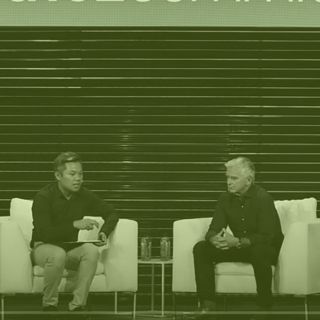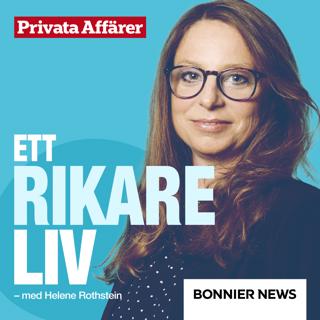
SaaS Go-to-Upmarket
For a SaaS company, it's easier to move upmarket than down, and this gives SaaS startups the advantage against incumbents. In this episode, David Ulevitch and our newest enterprise general partner Kristina Shen look at the SaaS go-to-upmarket with a focus on how to price for the move, including why so many founders underprice, how to think about free versus paid trials, and navigating the transition to larger accounts.
29 Maj 202021min

New Fan Engagement Models for Athletes and Influencers
Today’s episode is about a practical application of crypto — namely, the way it can “tokenize” fandom. More broadly, it’s about fan engagement, and the increasingly blurred lines between sports, culture and tech. We talked to NBA player Spencer Dinwiddie, of the Brooklyn Nets. Spencer created a new platform on the crypto blockchain Ethereum that gives fans the opportunity to invest directly in his revenue-generating potential, through debt securities. Joining this conversation are a16z managing partner and tech investor Jeff Jordan, who has long followed the evolving relationship between sports and tech. Also joining is Jesse Walden, a former a16z crypto partner and co-founder of Mediachain. He’s also a former music promoter and manager whose focus was on helping artists stay independent. We discuss the evolution of models for fan engagement; how social media has changed the game; and where technologies like cryptonetworks and blockchains come in.
26 Maj 202019min

Don't Call it a Brain in a Dish!
Our understanding of the human brain and its disorders has always been limited by our lack of access to living, human, developing brain tissue. For the first time, that's changing. In this episode, Sergiu Pasca, Professor of Behavioral Science at Stanford, talks with a16'z General Partner Vijay Pande and Hanne Tidnam about the wild new tech that's pioneering a whole new approach to understanding the brain: brain organoids.So what are brain organoids, what are the scientific breakthroughs that lead to their creation, and how can we use them best? The conversation starts with the existing models we have used to learn about the living brain, from genetic studies to autopsies to primates—and what this new model now brings us: the ability to study the human brain, both how it develops and what goes wrong in certain disorders, with human brain tissue "alive" in a dish. We talk about what these organoids can and can’t do; what they’re good for understanding and where that understanding becomes limited; why calling these “brains in a dish” or “mini-brains” isn’t the right terminology at all; and finally, how far can this new tool and model be taken now and in the future, leading us closer towards understanding psychology itself on a molecular level.Image: Brain organoids derived in the Pasca Lab at Stanford University.
24 Maj 202043min

Pandemics: Early Detection, Networks, Spreaders
Pandemics are predictable; what's not predictable is the intensity, or the precise timing of arrival. That's where early detection -- not just rapid warning (as with something like Google Flu Trends back in the day), or even delayed warnings (as with CDC flu trackers and such) -- comes in. Because unfortunately, many disease tracking efforts old and new are "like watching the weather forecast a week after you've experienced that weather", observes a16z general partner Jorge Conde.And this matters for saving lives; for load balancing and allocating resources (ventilators, PPE, supplies); getting back to work; and much more. Even a two-week advantage could have made a huge difference! Which is what sociologist and physician Nicholas Christakis (who directs the Human Nature Lab, part of the Yale Institute for Network Science, and also author of the book Blueprint) learned from the H1N1 pandemic. Specifically, the role of social network "sensors" -- where friends in one's network graph can be like canaries in the proverbial coal mine to help detect pandemics earlier.In fact, the lab recently released an app called Hunala (which uses information crowdsourced among networks) to determine one's likelihood of contracting flu/ influenza-like or other respiratory illnesses through a personalized daily assessment of risk. Kind of like Waze, but for illnesses not car accidents. So in this episode of the a16z Podcast, the two take that analogy far. They also discuss the role of other mobility data and population flows in China for where and when the pandemic spread; the nuances behind "superspreaders"; how bad is the coronavirus, really; and the near future of "bio-surveillance" -- not just from a personal risk perspective, but from a global public-health perspective... Can we get the holy grail here without sacrificing privacy and agency?
23 Maj 202034min

Podcasting and the Future of Audio
This podcast (first recorded in 2019, now being rerun) -- is a podcast about podcasting: But it's really all about audio. A lot's changed... and a lot hasn't. How do we define "podcasts"; how does the feeds ecosystem currently work; what content and entertainment experiments might change how people not just consume, but create, in the medium? Not to mention monetize, discover, etc... Nick Quah, writer and publisher of Hot Pod (also at Vulture) joins a16z general partner Connie Chan -- and editor in chief (and showrunner of the a16z Podcast) Sonal Chokshi -- to talk about all this and more in this hallway-style jam. The views expressed here are those of the individual AH Capital Management, L.L.C. (“a16z”) personnel quoted and are not the views of a16z or its affiliates.This content is provided for informational purposes only, and should not be relied upon as legal, business, investment, or tax advice. You should consult your own advisers as to those matters. References to any securities or digital assets are for illustrative purposes only and do not constitute an investment recommendation or offer to provide investment advisory services. Furthermore, this content is not directed at nor intended for use by any investor or prospective investor, and may not under any circumstances be relied upon when making a decision to invest in any fund managed by a16z. (An offering to invest in an a16z fund will be made only by the private placement memorandum, subscription agreement, and other relevant documentation of any such fund which should be read in their entirety.)Past performance is not indicative of future results. Any charts and graphs provided within are for informational purposes solely and should not be relied upon when making any investment decision. Please see https://a16z.com/disclosures for additional important information.
20 Maj 20201h 6min

Growth in Turbulent Times
In normal times, every company operates against some hypothetical growth model—a data-driven framework that describes how your product grows and how you acquire new users. These, of course, are not normal times. In the fallout from the pandemic, most founders and CEOs are in the process of completely revamping their growth models from the bottom up amid new and unpredictable consumer behavior. This episode explores how to think about growth in turbulent times, according to two growth experts: a16z general partner Andrew Chen, who previously led the growth team at Uber, and Brian Balfour, formerly the VP of Growth at HubSpot, now the founder and CEO of Reforge, a masterclass in growth strategies (in conversation with host Lauren Murrow).The discussion spans four sections: first, how to reassess your existing growth model, particularly when, as Brian says, the data is "completely messed"; next, we drill down into strategy and tactics for surviving the current crisis and talk about how founders can pursue growth even in the midst of widespread uncertainty and cutbacks. Third, we look ahead to discuss scenario planning and how leaders can forge a path forward. Finally, we zoom out and assess the big picture: how various categories of company may be impacted long-term, how this crisis compares to 2008 (and what that means for early-stage founders), and the industries and business models that are now prime for growth.
15 Maj 202036min

Journal Club: Using CRISPR to Prevent Coronavirus and Influenza Infection
In this episode of a16z bio Journal Club, general partner Vijay Pande, bio deal team partner Andy Tran, and bio editor Lauren Richardson discuss a novel CRISPR-Cas-based anti-viral strategy.The discussion covers the differences between this newly developed prophylactic strategy, traditional vaccines, and anti-viral drugs; how this strategy can be engineered to target a huge range of coronavirus and influenza strains; and the next steps needed to go from paper to practice:“Development of CRISPR as an Antiviral Strategy to Combat SARS-CoV-2 and Influenza” in Cell (April 2020), by Timothy Abbott, Girija Dhamdhere, Yanxia Liu, Xueqiu Lin, Laine Goudy, Leiping Zeng, Augustine Chemparathy, Stephen Chmura, Nicholas Heaton, Robert Debs, Tara Pande, Drew Endy, Marie La Russa, David Lewis, and Lei Qia16z Journal Club (part of the a16z Podcast), curates and covers recent advances from the scientific literature -- what papers we’re reading, and why they matter from our perspective at the intersection of biology & technology (for bio journal club). You can find all these episodes at a16z.com/journalclub.
15 Maj 202017min

What's Next in Gaming
Video game technology has evolved into a global phenomenon that extends far beyond entertainment. In this episode, John Riccitiello, CEO of the game software development company Unity Technologies, is interviewed by a16z general partner Andrew Chen on the rise of esports and streaming, the potential of cloud gaming, and far-reaching applications for game technology. This conversation originally took place at our most recent innovation conference, the a16z Summit.
7 Maj 202020min





















